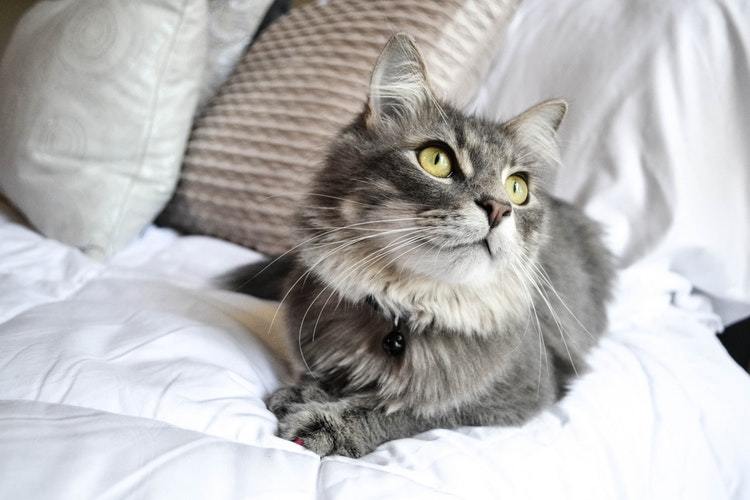Veterinary clinics are overfilled with last-minute cases, shelters keep dealing with returned adoptions, and you can still find many online ads of people who want to give their pets away. What’s the reason for that? People think that owning a pet is a piece of cake, especially cats — what could go wrong? All you have to do is to provide your cats with enough food, water, and something to play with.
And that’s the biggest mistake you can do — just owning a cat instead of being its friend and responsible caregiver. Letting the animal live all by itself instead of getting to know its behaviours and habits. That leads to the matter of the article — negligence (even unintentional!) and the most common cat’s behaviours that owners tend to ignore or misinterpret.
- When the Cat Drinks Too Little Water
It’s easy to notice if your cat eats enough but the estimation if its water consumption is appropriate requires much more of the owner’s attention. Conscious cat owners know that their purring pals like a little bit of variety in their lives. To make your cat more interested in drinking water, make it fun!
Look for top cat water fountains, put water bowls in untypical spots, use water containers in different shapes — e.g., cats love sticking paws into glasses of water or their whole heads into jars. This will trick your cat into drinking more.
Your cat might naturally not feel thirsty if you’re feeding him wet food. To increase your cat’s water consumption, in that case, you can add a little more water to the food.
When it comes to the kind of drinking water, the best will be simple tap water. Boiled water isn’t recommended for animals at all nor is mineral water. If you’re worried that the tap water at your apartment is too contaminated, use filter!
- When the Cat Visits the Litter Box Too Often (Unsuccessfully)
Watching your cat going to its litter box surprisingly is the right thing to do — especially if it’s a senior or an older adult already. Peeing often is not a problem unless your cat goes to the box more often than usual, but is unable to urinate and you can see spots of blood in the litter.
This constant need and impossibility to urinate is usually a sign of bladder stones. It’s a common and incredibly painful disease. Neglected can easily lead to death. You can prevent your cat from the illness with helping it stay properly hydrated limiting its sodium consumption — that’s why cats shouldn’t eat human food nor drink mineral water.
- … or Relieves Itself Outside the Litter Box
Pooping and peeing outside the litter box isn’t your cat being mean, misbehaving nor hating you. This kind of behaviour can suggest that your cat doesn’t like the new litter, has territorial problems or that it suffers from paw injuries.
Territorial problems are a common aspect of the beginnings of a cat’s adaptation process. Usually, it’s something that the new owners of a stray or abandoned animal just have to go through (sometimes it takes a couple of days, other times a couple of months). It can also happen if there’s a new housemate at your place — either a roommate, a newborn child or another animal.
Cat’s paws are extremely sensitive. Once injured they can cause lots of pain, especially on such an unpleasant grainy surface as litter. But not only cat’s paw pads are vulnerable. Cat’s claws are also exposed to various injuries (e.g., during careless clipping). What’s more, procedures as declawing and applying silicon claw caps, even though quite popular, are very harmful and can also result in such behavioural disorders.
- … or Lies Down in the Litter Box
Cats are famous for hiding in the weirdest places and trying to fit into the tiniest boxes. Seeing a cat lying down in its litter box isn’t very surprising — just another kitty quirk!
Nothing more wrong.
Laying down in a litter box is far from natural nor funny. It’s a sign for cat’s fear and insecurity. It means that your cat is so frightened that it has to cover itself in its own faeces to calm itself with the most familiar smell — its own urine.
It can be a symptom of territory problems or severe phobias. If you can’t identify the exact problem and your cat won’t stop calming itself in this certain way, look for professional help of a feline behaviourist.
- When the Cat Is Purring Intensively
Purring is commonly associated with a cat feeling safe, calm, and satisfied. However, cats purr also when they’re sick. The low tones of this particular vibrating are supposed both to calm the cat down and to help its organism heal.
If you’ve noticed that your cat has been behaving slightly differently and purring more than usual, you might want to consult its doctor. Cats are tough creatures and won’t show you pain nor any other symptoms that would make them look vulnerable. It’s because of the primal survival instinct encrypted in the cat’s genes.

Leave a Reply